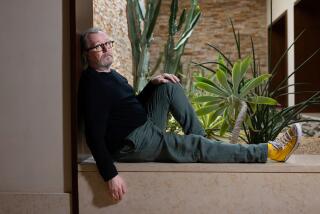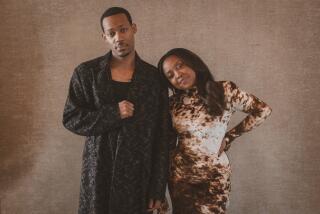Rebecca Miller keeps her eye on the fly
- Share via
In “Jacob’s Folly,” Rebecca Miller has landed on a narrative voice that’s antique, droll, racy and occasionally cutting — imagine an 18th century French rake being played by David Niven. But instead of putting an elegant, handsome man behind that voice, Miller has given it to a fly.
A common housefly, yes, but more importantly, it’s the proverbial fly on the wall. Embodying that metaphor so literally is silly but also brilliant; in a sense this is what writers do, spy on their invented worlds, eavesdrop on their characters. The fly, Jacob, can and does.
After dying in Paris in 1773, Jacob is reincarnated over contemporary suburban Long Island, a long way, geographically and temporally, from the site of his last blithe breath in a comfortable bed, tended by servants.
“When I was alive, I was dark, short, slight, with light blue eyes, strong teeth, and a thick, long sex which I scented and coiled inside my britches daily with great care and pride,” he recalls. Now he imagines himself an angel, “a fully-formed Christian seraph” of great beauty, sent by a benevolent god on a mission.
From his vantage point, Jacob observes two people in detail: Leslie, a volunteer fireman and small-business owner, and comely Masha, a Jewish Orthodox woman. He has access to their inner thoughts and histories, which convinces him that his task must be to bring them together. Their stories intertwine with Jacob’s in a delicately balanced triple narrative that jumps across centuries.
In France, Jacob was a Jewish street peddler in marginal circumstances, trapped in a lousy marriage as a teenager. How he gets from there to his wealthy demise — seemingly an impossible leap — is one question that drives the narrative’s momentum. But it’s his richly imagined life in Paris that makes the story delightful: details of ritual handwashing, his poisonously flatulent wife, a mystical cousin and a meticulous police officer overseeing the tiny Jewish population.
This being the Enlightenment, there is also a tension between superstition and faith and philosophy and reason — something Jacob embodies more than he can see himself.
More than 200 years later, Masha’s Orthodox family carries on many of Jacob’s old traditions. Men wear yarmulkes and tallis; women dress modestly, cover their hair and don’t touch men who aren’t their husbands. Their close-knit community remains apart from most of the society around them, but Masha, with a small streak of independence (and a slight psychic push from Jacob the fly), finds within herself an irresistible desire to act. Surreptitiously taking theater classes brings her into dangerous contact with the outside world. And Leslie.
Leslie is a 21st century American hero, strong-silent edition. Physically large, generous, generally happy, he is sturdy and responsible. He supports a sprawling, multi-generational family with his boat repair business; when the recession starts to hit town, he does the stand-up thing and takes a job he’d rather avoid. That job, at the service of a rich boat owner, gives Miller a chance to draw a hysterically funny picture of idle wealth and the man himself, who has become absurdly young and odd-looking thanks to an overdose of plastic surgery.
That might be something that Miller has seen in real life — as the wife of actor Daniel Day-Lewis and the daughter of playwright Arthur Miller, she’s certainly had access to wealthy art patrons, actors and film executives. She’s had a film career of her own, writing and directing “The Private Lives of Pippa Lee” and “Personal Velocity,” both from books she had written.
Where those projects were close, intimate stories, this is an imaginative leap in new direction, yolking historical fiction to a contemporary drama with a device that, were it written less skillfully, would simply be preposterous. But it is not.
This is in part because of Jacob’s amusing voice and fish-out-of-time observations: 21st century women are disappointingly sloppy, elevators are terrifying. Yet while Jacob is steering the story, when Leslie or Masha is front and center, we hear their voices. The antique language slides away and is replaced by the New York-ese of a conflicted man and a confused, hopeful young woman.
Masha wants to live a good Orthodox life, but she also wants to act, and she’s quietly torn apart by the irreconcilable worlds. On stage, she’s captivating, a standout talent. Both she and Jacob veil their traditional Jewish upbringing to create a public secular self, and the book implies that there may be a connection between that dichotomy and the ability to inhabit an invented character onstage. Yet the connection is hardly made in the text; it’s clear only in the subtle parallel structure of Masha and Jacob’s lives.
In a book this complex and ambitious, there are bound to be a few rough patches, and in “Jacob’s Folly” it’s that the end arrives too quickly. The lushness of detail drops away as Leslie and Masha’s fates collide, and Jacob’s successes are more thinly rendered than his troubles. In places, Leslie’s point of view fades, and Masha is a bit opaque — what she loves about acting isn’t entirely clear.
All of these are quibbles — a rushed ending is hardly an offense in a book as delightful, bawdy, detailed and complicated as this.
Jacob’s Folly
By Rebecca Miller
Farrar, Straus and Giroux: 384 pages, $26
More to Read
Sign up for our Book Club newsletter
Get the latest news, events and more from the Los Angeles Times Book Club, and help us get L.A. reading and talking.
You may occasionally receive promotional content from the Los Angeles Times.








